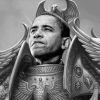- 27 Jun 2013 03:00
#14262185
Is it time to admit the Democratic Republic of Congo does not exist, and allow the current state to split and fragment into its cultural/political groups to form their own states?

The international community needs to recognize a simple, albeit brutal fact: The Democratic Republic of the Congo does not exist. All of the peacekeeping missions, special envoys, interagency processes, and diplomatic initiatives that are predicated on the Congo myth -- the notion that one sovereign power is present in this vast country -- are doomed to fail. It is time to stop pretending otherwise.
We wrote those words on ForeignPolicy.com four years ago, and they ring even more true today. Congo is not a failed state; it is a nonstate, incessantly at war for the last 17 years, and home to some of the world's worst violence. Perhaps as many as 5 million people (no one really knows, given the chaos in the country) have died since President Mobutu Sese Seko's removal from power in May 1997, and the horror continues with "children murdering in gangs, civilians massacred by the thousand, rape as common as petty thievery," as the Economist described it more recently. Not only does Congo rank second (behind only Somalia) on this year's Failed States Index, but it ranks 186th (tied with Niger for dead last) on the U.N. Human Development Index; 229th out of 229 in GDP per capita (behind even Somalia and South Sudan); 160th out of 176 on Transparency International's Corruption Perceptions Index; and 171st out of 177 countries on the Heritage Foundation's Index of Economic Freedom. If there is a prize for the worst place on Earth, Congo has a strong claim.
Unfortunately, the international community's response to the Congo myth has been to continue to support the existing government, despite an astonishing record of failure, while avoiding any consideration of an alternative. Even though Congo has received an enormous $27 billion in development assistance since 2000 -- making it perhaps the world's largest recipient of international assistance after Afghanistan -- the state remains mostly irrelevant outside Congo's capital, not for lack of money but at least in part because donors have continually rewarded the central government's failure to rule, ignored corruption, and dismissed concerns about questionable elections. It's as if the world wishes to believe in the idea of Congo rather than engage with the actual place that exists -- a certain prescription for disaster.
But why? The Congo myth persists for several reasons. First, African leaders in Congo's neighborhood who should be most concerned about the country's catastrophe dislike any questioning of state sovereignty, given that many of them do not have full control of their own territories. The international community, reluctant to devote anything like the diplomatic energy and political capital that would be necessary to think about a real solution in Congo, is happy to oblige. Despite all the protestations about the horrific war, systematic violence against women, and regional instability, Congo hardly gets attention from the powers that be in Washington or Turtle Bay, where worries about sovereignty tend to be discussed only when they happen to fall on a geopolitical fault line like the Middle East (see: the Palestinian territories) or right in the heart of Europe (like Kosovo). Finally, there are a great many people inside and outside Congo who profit immensely from a large, barely governed territory full of minerals and opportunities for extortion, trafficking, and smuggling. They have a profound interest in ensuring that Congo doesn't become anything more than the pseudo-country it is today.
And in today's Congo, let's be clear: There is no sovereign power at all outside the urban areas, leaving two-thirds of the country's estimated 75 million people beyond the purview of a central government. In November 2012, the M23 rebel group (widely thought to be backed by Rwanda, something Kigali vehemently denies) seemingly walked past U.N. peacekeepers to occupy Goma, capital of North Kivu province and generally seen as the gateway to Congo's east. After mocking the Congolese state, the rebels left 10 days later and melted into the forest. But they clearly showed they could return at will. This past March, in the province of Katanga, fighters of the Mai-Mai Bakata Katanga (whose name in Swahili aptly translates as "Dividers of Katanga") briefly entered Lubumbashi, Congo's second-largest city, and clashed with government forces before surrendering. The attack rattled many as it harked back to old fears that the province would try to secede, given that it broke away from the newly independent Congolese state for three years in the early 1960s and foreign allies had to intervene twice in the 1970s to help maintain Kinshasa's rule over the mineral-rich area. There are many other such insurgencies elsewhere in the country, from the Mai-Mai Morgan in Congo's Eastern province to the Mai-Mai Raia Mutomboki in North Kivu and South Kivu.
But U.S. policy toward Congo seems to ignore this widespread lawlessness. In 2009, U.S. Secretary of State Hillary Clinton's brief visit to Congo underscored all the facets of the Congo myth. The very agent that the secretary hoped would solve the outrages of rape and appalling living conditions -- the Congolese state -- is in fact at the core of the problem. U.S. backing of Kinshasa inevitably became associated with the cruel dysfunction of the Congolese state three years later, when members of a Congolese army battalion trained by the United States were accused of raping 130 women and girls last fall -- a charge corroborated by a recent U.N. investigation. The U.S. Defense Department, of course, duly condemned the crimes and said that its training had included respect for human rights, especially for women. But such training is designed for militaries that function as hierarchical structures in which soldiers are motivated to protect their fellow citizens. In Congo, nothing could be further from the reality. The U.N. special representative for sexual violence in conflict, Zainab Hawa Bangura, couldn't initially determine who in the military was responsible because, she said, "The military was in disarray. There was no command structure." This is what Washington has reaped from aiding the Congolese state.
Yet, still determined to try to preserve Congo, the U.N. Security Council this past March authorized a 3,000-strong "intervention" brigade with an unprecedented "offensive" mandate to tackle rebels in eastern Congo. An expression of African resolve, these troops are nonetheless too few and the territory too vast to ensure peace. Instead, they are more proof that the international community is merely pretending that a state exists, a dangerous mistake that leads inevitably to pathologies that do the most harm to the defenseless.
At some point, the world must recognize that trying to aid the notional government of Congo in the hope that something will change is a bad play. Until now, the world has either turned a blind eye or, worse, for strategic or commercial advantage, indulged Kinshasa by providing aid, meanwhile taking on ever more of the responsibilities that should be the central government's preserve.
Granted, there are no easy or quick solutions. And despite Congo's almost uninterrupted record of failure, there is no strong consensus about developing alternatives to the current government. But that is largely because the world has not provided any incentives to think about alternative scenarios: a Congo divided into different states, a Kinshasa with varying levels of sovereign control over different regions, more formal responsibilities for the international community in the provision of security and services, or any other idea that might move away from the 50-year fixation on aiding a failed state. Simply bowing to the facts on the ground and admitting that there is no such thing as Congo would be a good start.
http://www.foreignpolicy.com/articles/2 ... e?page=0,1
Is it time to admit the Democratic Republic of Congo does not exist, and allow the current state to split and fragment into its cultural/political groups to form their own states?





























 - By Fasces
- By Fasces